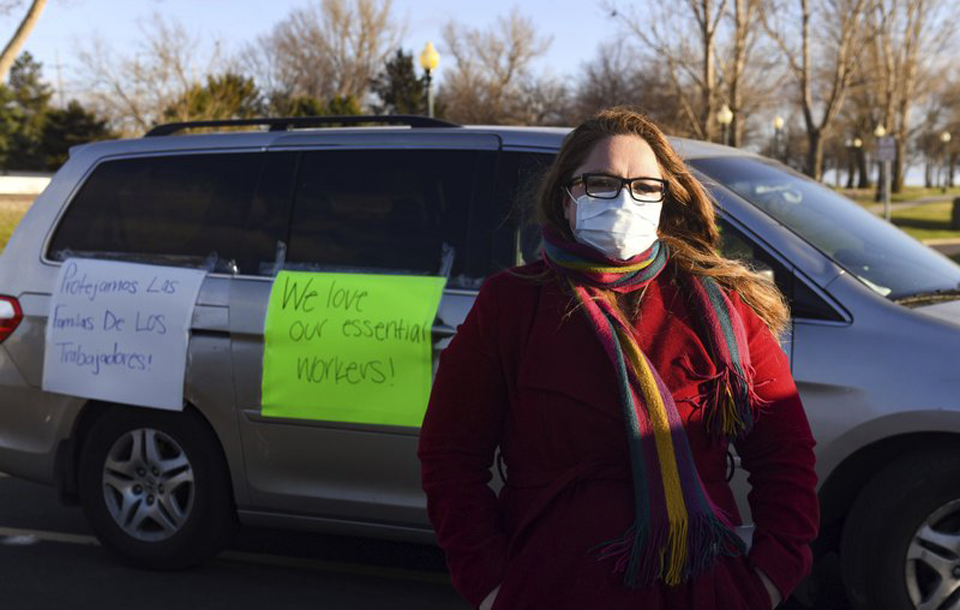
SIOUX FALLS, S.D.—Augustín Rodríguez, 64, arrived on time for every one of his shifts, never absent a day at Smithfield Foods here, where he labored for 20 years.
Rodríguez, who came from El Salvador, continued to go to work at the UFCW-organized plant after he developed a fever and cough because he had to work to pay the bills. On April 1, the pain in his side became too much for him to bear and forced him to call in sick three days in a row. On April 4, unable to take the pain anymore, he was hospitalized.
On April 9, his wife, Angelita, received a call from a testing lab telling her to self-quarantine because her husband had tested positive for COVID-19. Her husband was put on a ventilator for two weeks.
He died Tuesday, becoming the first person at the Smithfield plant to lose his life to the coronavirus.
He has been dead only for three days now, and already more than 700 people connected to his workplace have tested positive for COVID-19, pushing infections in the state to well over 1,000.
The soaring infection rate among the 6,700 workers at the now-shuttered Smithfield pork plant and among Sioux Falls residents in general have made the town the new epicenter of the pandemic in the United States.
“It’s not God who is to blame; it’s not the coronavirus that is to blame,” Augustín’s wife Angelita said. “It’s Smithfield. I lost him because of that horrible place,” she told Mackenzie Huber, a young reporter for the Argus Leader. Huber told People’s World that she doesn’t speak Spanish so, when at the Rodríguez home, she used the services of a translator.
“Those horrible people and those bosses,” Angelita said, “They’re sitting in their homes, and they’re happy as they spend time with their families.”
While those Smithfield bosses shelter in place at their comfortable homes, and as Sioux Falls becomes a new epicenter of the coronavirus pandemic, South Dakota’s GOP Gov. Kristi Noem refuses to issue a state-wide shelter-in-place order.
As infection and death spread like wildfire through Sioux Falls now, in a state only recently cited by President Donald Trump as one of the places “untouched” by the virus, the governor says “this crisis is something that the people of this state and this country will just have to tough out.” Her primary concern, she says, is to get the Smithfield plant up and running as soon as possible.

South Dakota’s Republican Sen. John Thune is apparently equally unconcerned about the health aspect of the crisis in his state. He has co-signed a letter with GOP senators and House members in Plains and Midwest states urging Trump Secretary of Agriculture Sonny Perdue to rush emergency financial aid, not to the worker victims, but to Smithfield and any other meat plants forced to close.
Realizing almost immediately that their Republican governor could be depended upon for nothing, the workers at the plant and their community supporters, led by the labor movement in Sioux Falls, began taking action immediately to save themselves.
Joe Sneve, a reporter for the Argus who lives in the nearby northern suburbs, told People’s World that, as soon as news of infection in the plant got out, workers and residents in the Sioux Falls area organized a car caravan that descended upon the plant. “They had signs and honked horns, demanding that measures be taken to protect the safety and the health of the workers and the community,” he said.
Kooper Caraway, president of the Sioux Falls AFL-CIO, which represents 30 unions in the area, immediately moved his organizations into action, pressuring the mayor, Paul TenHaken, to issue a stay-at-home-order.
B.J. Motley, the president of Local 304A of the UFCW, which represents the 6,700 workers at the plant, mobilized his workforce in support of demands for shutting it down until it could be made safe. They were able, at first, to get the company to agree to a three-day closure and then to a 14-day shutdown. Smithfield, of course, pretended that the closures were their own ideas, motivated by their alleged concern for worker health.
Even with those successes, however, it has been necessary to fight Smithfield every step of the way. “During that first three-day shutdown for alleged deep cleaning, they didn’t really fully close down as they said they would,” Caraway explained. “They actually kept 65% of their regular operation going throughout.” Only now, Caraway said, are they remaining closed for a two-week period.
The CDC went into the plant with a team yesterday to conduct a study aimed at determining what needs to be done to re-open the plant.
Sneve confirmed that the company is being anything but transparent about yesterday’s “inspection.” It prevented his newspaper, The Argus Leader, and all other press, for that matter, from joining with the group conducting the inspection of the plant. Smithfield’s excuse for barring the press: “Only essential workers are allowed in.”
Labor movement pressure on Mayor TenHaken, at least, has borne fruit, as he has put forward a proposal, in defiance of the governor, for a stay-at-home order for Sioux Falls.
“TenHaken at least seems to care about the workers and the people in the town,” said the UFCW’s Motley, “but it will be an uphill battle getting that stay-at-home order through the town council.”
Caraway argued in favor of the order for Sioux Falls at a council meeting last night, but there was significant resistance form right-wing council members who back the governor. So-called “liberty supporters” showed up and were there arguing that stay-at-home orders violate constitutional rights. The measure comes up for the required second hearing and vote next Tuesday. The unions and community groups in favor are hopeful but not entirely confident that they will prevail.
“Looking at some of these council members and local businesses, I’m not so sure,” Sneve said. “There are a lot of folks in South Dakota who are not at all happy about government regulating anything.”
The labor movement in Sioux Falls is not giving up, however. Caraway vows that the AFL-CIO unions will continue to push, and he says they have already scored gains that put them in a good position to strengthen the voice of workers not just during but also after the pandemic.
At the age of 29, he is the one of the youngest labor council leaders in the country. He leads his council along with Motley of the UFCW, who serves as Secretary-Treasurer.
Some 50 languages and 300 dialects are spoken by the workers in the plant. Under the leadership of Caraway and with strong support from the UFCW’s Motley, the union organized an International Solidarity Committee which, Caraway said, “educates incoming workers, both immigrants and refugees, and works with U.S.-born workers to clue them in on labor developments around the world.”
The solidarity work of the unions was important in the broader community, too, he said, doing things like organizing the first ever Native American Day parade in Sioux Falls.
With Caraway’s leadership, the unions are pushing for more than just protection for workers at the point of production in this plant which, alone, accounts for 5% of the nation’s supply of pork products. (The Sioux Falls plant, he said, is a “total production facility where the hogs come in alive at one end with packaged meat products ready for shipment to the nation’s supermarkets at the other end.”
“We are fighting a governor who makes Ayn Rand look like a liberal humanist,” he said. “She has said she opposes shelter-in-place orders because people should be free to do whatever they want, regardless of how that might result in harm to others.”
In addition to safety measures inside the plant, he said the unions are pushing hard for a halt to evictions, for paid leave, and for extended and enhanced unemployment benefits. “This is a big deal,” he said, “in South Dakota, which serves essentially as another Cayman Islands for the Plains States.” He was referring to the many corporations that have their official headquarters in the state to take advantage of the almost total absence of regulations on how they do business.
Their protection of these hideouts for corporations is just one more reason to sweep Trump and Republicans across the country out of office this November. South Dakota is the notorious headquarters for credit card companies and loan companies, for example, that charge anywhere from 25 to 700% interest, compounded daily, for their financial products.
Caraway took issue with the scare campaign Smithfield is waging regarding the nation’s meat supply, calling it an “exaggeration.” The company is saying that the shutdown will diminish drastically the nation’s meat supply and that the meat companies are using that as an excuse to squeeze bailout money from taxpayers. “There is enough money in their coffers to make their production facilities safe and to turn out products,” he said. “But for right now, the health and safety of the workers and the surrounding community has to come first.”
Both he and Motley described the dangerous conditions workers face in the Smithfield plant.
“It is impossible to do any kind of social distancing in there,” Motley, who has worked in the plant for 30 years, said. “We are working elbow to elbow in there, cramped together in unclean conditions.”
“The place is 100 years old,” Caraway said, with narrow old staircases and hallways, tiny locker rooms with people jammed into them, and people working whole shifts in incredibly close proximity to one another.”

Caraway is convinced that the labor movement has a major role to play not just in getting the country through the pandemic but in building the restructured society needed afterwards.
“Labor has always been in the forefront,” said the young AFL-CIO leader, “but today conditions are requiring a new and invigorated labor movement. When I first got elected to this job people said, ‘Be careful. Don’t be too radical.’ But I have found that has not been a problem. I always speak out, and I have gotten support for our initiatives from the AFL-CIO leadership, President Richard Trumka, in particular.”
Soon after Caraway’s crew took over in Sioux Falls, when he was only 27, he told the press that some of the older labor leaders he replaced were “like bats hanging in a cave.” He said, “The only time they moved was in response to their own sounds, and the only organizing they did was at the annual Labor Day Picnic.”
Continuing, he said, “We have to get rid of some old notions, like the ‘Buy America’ campaign for example, which is a strategy destined for defeat. Corporations don’t recognize borders. We have to organize everywhere so that they don’t have any place to go. That’s why we are doing an International Solidarity Committee at the Smithfield plant.”
“These days,” he said, “the pandemic is showing how crucial the workers are to the nation. The corporations see this; they know how important we are, but we can’t count on them to change their ways when this pandemic is over. That change is something the workers will have to bring about. Restructuring into a fair economy will not happen otherwise.”
Like free stuff? So do we. Here at People’s World, we believe strongly in the mission of keeping the labor and democratic movements informed so they are prepared for the struggle. But we need your help. While our content is free for readers (something we are proud of) it takes money — a lot of it — to produce and cover the stories you see in our pages. Only you, our readers and supporters, can keep us going. Only you can make sure we keep the news that matters free of paywalls and advertisements. If you enjoy reading People’s World and the stories we bring you, support our work by becoming a $5 monthly sustainer today.












Comments